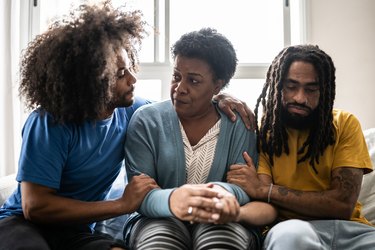
There are many positive things that can be passed down in families — your sense of humor, traditions, cherished memories and more. But you can also inherit emotional damage, a phenomenon called generational trauma.
Generational trauma — also called intergenerational trauma — is an emotional wound that extends from one generation to the next. Its effects can be seen in individuals, families and entire communities, and the cycle of inherited trauma often repeats itself.
Video of the Day
Video of the Day
"It's [a] series of events and behaviors that are related to events that happened many years ago to someone in your family that they then replicate, talk about or share in some way with their descendants," says Alfiee Breland-Noble, PhD, MHSc, psychologist, author and founder of the AAKOMA Project.
But you can break the cycle: Although healing from all types of trauma takes time, it is possible.
To help, here's an overview of intergenerational trauma, including what it is, what it looks like, who's affected by it, and ways to start healing.
What's Generational Trauma?
Canadian psychiatrist Vivian M. Rakoff, MD, was among the first to explore the definition of generational trauma in 1966 after finding that rates of psychological distress were high among children of Holocaust survivors, per the American Psychological Association (APA).
Since then, the term has evolved to refer more generally to trauma that's transmitted from one generation to the next through biological, social and psychological factors, according to Duke University.
Any traumatic event that causes deep distress can be passed on. Here is a non-exhaustive list of experiences that can lead to generational trauma, according to the APA:
- Systemic and cultural oppression
- War
- Genocide
- Poverty
- Slavery
- Assault or abuse
For instance, a parent may be unable to offer emotional support if their child is sexually assaulted because they haven't processed their own experience with abuse. Or a grandparent that refuses to face their scarring experience fighting in a war may in turn teach their grandchildren to dismiss and minimize their emotional hardships.
Another key component of intergenerational trauma is vicarious distress. "Trauma is not just about a traumatic event, but our response to the event," Breland-Noble says. "[It's] the idea that I can be a witness to something, and it impacts me as if I was the person that it was happening to."
Intergenerational trauma can look like the following, according to the Association for Child and Adolescent Mental Health:
- Unresolved emotions and thoughts about the traumatic event
- Poor parent-child relationships
- Complicated personality traits or personality disorders
- Negative repeated patterns of behavior
There are also physical effects of intergenerational trauma. For example, a February 2021 study in the International Journal of Environmental Research and Public Health found that historical trauma, stress and racism are linked to higher rates of cardiometabolic disease in Indigenous communities.
A June 2013 review in Obstetric Medicine also found that prenatal stress — like fears about parenthood or your baby's health — can have lasting physical consequences for the birthing parent and the child, including low birth weight, premature delivery and gestational diabetes.
And that's just the tip of the iceberg — research still has a long way to go in fully exploring the effects of intergenerational trauma. Nonetheless, the term is becoming more mainstream, says Ajita Robinson, PhD, grief and trauma therapist and author of The Gift of Grief.
"The public has become aware of the term generational trauma and are able to recognize how it has shown up in their lived experiences," Robinson says. "[Millennials] grew up with mental health being normalized — they have the language to identify that certain behaviors and familial norms are rooted in trauma."
Tip
Contrary to popular belief, using toxic positivity to diminish your experiences and emotions can actually get in the way of processing trauma, according to 2021 research in Educational Development in the Time of Crises.
Who Is Affected by Intergenerational Trauma?
Trauma is a common experience. Consider the following statistics from the National Council for Behavioral Health:
- Approximately 70 percent of adults in the U.S. have experienced at least one type of traumatic event in their lifetime.
- Approximately 90 percent of children who experience sexual abuse will develop post-traumatic stress disorder.
- Over 90 percent of people with behavioral health disorders have experienced trauma.
And intergenerational trauma, like other forms of trauma, can influence everyone. But some groups are disproportionately affected.
For instance, long-oppressed groups like LGBTQIA+ people, Black people, Indigenous people and people of color are especially vulnerable due to historical trauma, which is a type of intergenerational trauma experienced by a specific cultural, racial or ethnic group, according to the Administration for Children & Families (ACF).
That's because the legacy of major historical events like slavery, forced migration, the Holocaust and the brutal colonization of Indigenous populations can still be felt.
As a result, it's common for Black people and other people of color to fear the world around them due to historical and present-day systemic oppression and violence, per the ACF.
This fear, for example, can be found in both the dread and duty that Black parents have had to face in talking with their children about potential police encounters.
Communities with historical trauma are also susceptible to race-based traumatic stress, which is defined by Mental Health America as emotional damage caused by encounters with racism.
For example, an April 2014 study in Cultural Diversity and Ethnic Minority Psychology found a link between experiencing racial discrimination in school and depressive symptoms in Black adolescents.
Race-based traumatic stress also shows up in the workplace. In an older but still relevant June 2011 study in the Journal of Black Studies, researchers looked at how racism and sexism affect Black women at work (the study uses the term "women"). The research found that common work-related stressors include:
- Code switching to overcome barriers to employment
- Coping with racial discrimination and racism
- Being isolated and/or excluded
- Defending one's race
- Lack of mentorship
A May 2017 study in Social Science and Medicine found that because of such structural racism, Black people experience more stressful work environments than their white counterparts. And this disproportionate amount of stress may contribute to decreased mental health and cardiovascular functioning.
Race-based traumatic stress has also been linked to higher rates of anxiety, hypervigilance, guilt, shame, avoidance and numbing, per a September 2016 study in Psychological Trauma: Theory, Research, Practice, and Policy.
Tip
It's important to remember that intergenerational trauma can be compounded for people with multiple marginalized identities. "If you're Black and queer or Latinx and queer, you have to deal not only with racism, but also homophobia and/or transphobia," Breland-Noble says.
How Do We Start to Heal From Intergenerational Trauma?
Breaking the cycle of inherited damage can help you heal from intergenerational trauma. Here are some strategies to get you started:
1. Name Your Trauma
Vocalizing your trauma can be a powerful first step to your healing.
"We have to name what [intergenerational trauma] does to us," Breland-Noble says. "Sometimes you have to name it to yourself because the people you love aren't ready to hear it."
Acknowledging that you have experienced trauma can then help you process the emotions associated with it.
2. Claim Your Trauma
You don't have to accept or make peace with your trauma, but denying that it has happened can make it even harder to process.
"You don't have to embrace your trauma, but you do have to recognize that it exists and then do something about it," Breland-Noble says.
3. Practice Self-Care
Doing something about your trauma can start with tackling your emotional wellbeing by engaging in self-care practices that resonate with you. Breland-Noble suggests the following techniques:
- Guided meditation
- Exercise
- Eating nutritious foods
- Consuming media that uplifts you
4. Allow Relationships to Change
When your trauma is connected to someone you love, it isn't always easy to end the relationship or establish the boundariesyou need to feel safe.
"When it's time for a relationship to change, end or grow in a different direction, we have to allow that change to happen," Breland-Noble says. "With intergenerational trauma, sometimes we just accept people's behavior because we love them, but you have to set boundaries little by little. In doing so, you create more space for yourself."
5. Allow Yourself to Grieve
Ending the cycle of intergenerational trauma can lead to disenfranchised grief, where you may experience feelings of loss even if a death wasn't involved.
"It is key that trauma work is done alongside grief work," Robinson says. "Inevitably, when we peel back the layers of trauma, we are faced with having to 'grieve the gap' between what we received and what we needed."
6. Seek Support
You don't have to face your trauma alone, which is why receiving support can make all the difference. This can come in the form of seeing a mental health professional or joining an uplifting community.
Therapy has been stigmatized within BIPOC communities, Breland-Noble says, so it's important to find a culturally competent therapist. "[That way] you don't have to constantly explain aspects of your background and culture," she says.
Not only can counseling help you process your emotions, but a therapist can help you navigate the physical effects of trauma.
"I teach clients how to 'be in their bodies,' because trauma often involves numbing, disembodiment and escaping," Robinson says. She also encourages people to work on building the skills they need to help regulate their emotions and navigate distress.
And if therapy isn't an option, Robinson suggests finding or building community with people who understand you. "For some, this may be spiritual or religious spaces; for others, it may be online communities that center wellness," she says.
Tip
If you can't afford therapy, you still deserve support. Look for therapists who provide free or sliding scale services, especially to BIPOC and/or LGBTQIA+ folks, Robinson says.
- Obstetric Medicine: "Effects of prenatal stress on pregnancy and human development:" mechanisms and pathways
- ACF: "Trauma"
- National Council for Behavioral Health: "How to Manage Trauma"
- Duke University: "Inter-generational Trauma: 6 Ways It Affects Families"
- Cultural Diversity and Ethnic Minority Psychology: "School diversity and racial discrimination among African-American adolescents"
- Association for Child and Adolescent Mental Health: "Should mental health professionals understand intergenerational trauma?"
- Mental Health America: "Racial Trauma"
- Psychological Trauma: Theory, Research, Practice, and Policy: "Racial discrimination as race-based trauma, coping strategies and dissociative symptoms among emerging adults"
- International Journal of Environmental Research and Public Health: "Stress and Cardiometabolic Disease Risk for Indigenous Populations throughout the Lifespan"
- APA: "The legacy of trauma"
- Social Science and Medicine: "Structural Racism in the Workplace": Does Perception Matter for Health Inequalities?"
- Journal of Black Studies: "Black women talk about workplace stress and how they cope"
- Educational Development in the Time of Crises: "Transcending Adversity: Trauma-Informed Educational Development"
Is this an emergency? If you are experiencing serious medical symptoms, please see the National Library of Medicine’s list of signs you need emergency medical attention or call 911.



